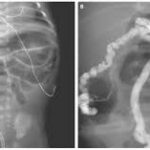Meconium aspiration syndrome (MAS) is a serious respiratory condition that occurs in newborns when they inhale meconium-stained amniotic fluid (MSAF) before or during delivery. This condition can cause airway obstruction, lung inflammation, and difficulty breathing, requiring immediate medical intervention.

Causes of Meconium Aspiration Syndrome
MAS occurs when a fetus experiences fetal distress, leading to the premature passage of meconium (the baby’s first stool) into the amniotic fluid. Common causes include:
- Post-term pregnancy (beyond 40 weeks): Increased likelihood of meconium passage due to mature fetal intestines.
- Fetal hypoxia (oxygen deprivation): Stress in the womb causes the baby to gasp and inhale meconium-stained fluid.
- Maternal health conditions: High blood pressure, diabetes, or infections increase the risk.
- Umbilical cord complications: Prolapse or compression can cause oxygen deprivation.
- Difficult labor and delivery: Prolonged or complicated births elevate fetal stress levels.
Symptoms of Meconium Aspiration Syndrome
Newborns with MAS exhibit signs of respiratory distress shortly after birth, including:
- Bluish skin (cyanosis)
- Labored or rapid breathing (tachypnea)
- Grunting or nasal flaring
- Decreased heart rate (bradycardia)
- Poor muscle tone and lethargy
- Low Apgar score at birth
Diagnosis of Meconium Aspiration Syndrome
A clinical diagnosis is made based on the following assessments:
- Amniotic fluid examination: Presence of meconium-stained amniotic fluid during labor.
- Chest X-ray: Identifies patchy lung opacities, hyperinflation, or atelectasis.
- Blood gas analysis: Determines oxygen and carbon dioxide levels, revealing respiratory compromise.
- Clinical evaluation: Symptoms of respiratory distress immediately after birth.
Treatment and Management of MAS
Early and appropriate medical intervention significantly improves outcomes for newborns with MAS.
Initial Stabilization
- Suctioning the airway: If meconium-stained amniotic fluid is detected, immediate suctioning of the mouth and nose is performed.
- Oxygen therapy: Supplemental oxygen is provided to maintain adequate oxygen saturation.
- Positive Pressure Ventilation (PPV): Helps expand the lungs and improve oxygen exchange.
- Mechanical Ventilation: Required in severe cases where the infant struggles to breathe independently.
Medical Interventions
- Surfactant therapy: Administered to reduce lung surface tension and improve oxygenation.
- Antibiotics: Given to prevent or treat secondary infections like pneumonia.
- Nitric Oxide Therapy: Used in severe cases to improve blood oxygen levels by relaxing lung blood vessels.
- Extracorporeal Membrane Oxygenation (ECMO): A last-resort intervention for newborns with critical lung dysfunction.
Complications Associated with MAS
While most cases resolve with prompt treatment, MAS can lead to complications, including:
- Persistent Pulmonary Hypertension of the Newborn (PPHN): Increased pressure in lung arteries reduces oxygen delivery.
- Pneumothorax (collapsed lung): Trapped air causes lung collapse, requiring emergency intervention.
- Brain Damage (Hypoxic-Ischemic Encephalopathy – HIE): Prolonged oxygen deprivation may lead to neurological impairments.
Prevention of Meconium Aspiration Syndrome
Preventive strategies can significantly reduce the incidence of MAS and improve neonatal outcomes.
Prenatal Prevention Measures
- Regular fetal monitoring: Identifies early signs of fetal distress.
- Timely induction of labor: Reduces the risk of prolonged pregnancy and meconium passage.
- Maternal health optimization: Managing hypertension, diabetes, and infections lowers fetal stress.
- Avoiding post-term pregnancies: Induction at 41 weeks prevents meconium-stained fluid exposure.
Intrapartum Management
- Amnioinfusion: Dilutes meconium-stained amniotic fluid, reducing the risk of thick meconium aspiration.
- Immediate airway management: Skilled neonatal resuscitation teams are essential at high-risk deliveries.
Meconium aspiration syndrome is a serious but preventable neonatal condition requiring immediate medical attention. Through early detection, proper management, and preventive strategies, the risks associated with MAS can be significantly minimized, ensuring better outcomes for newborns worldwide.

